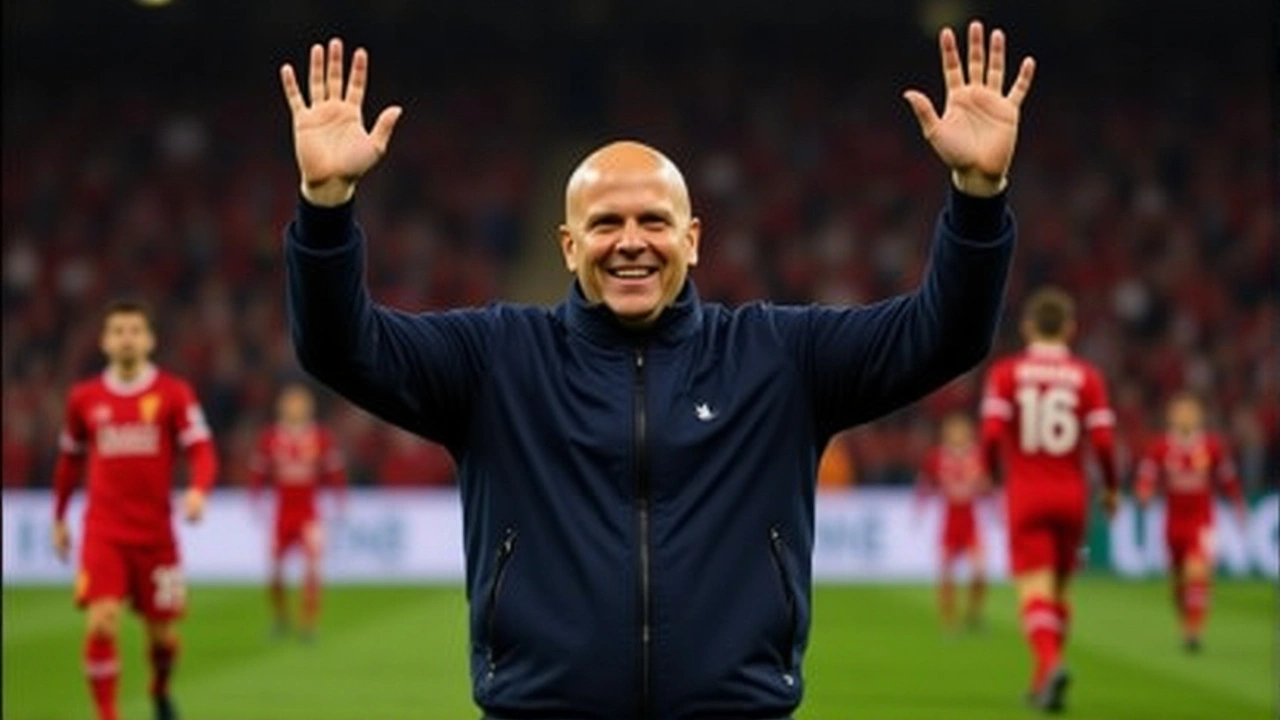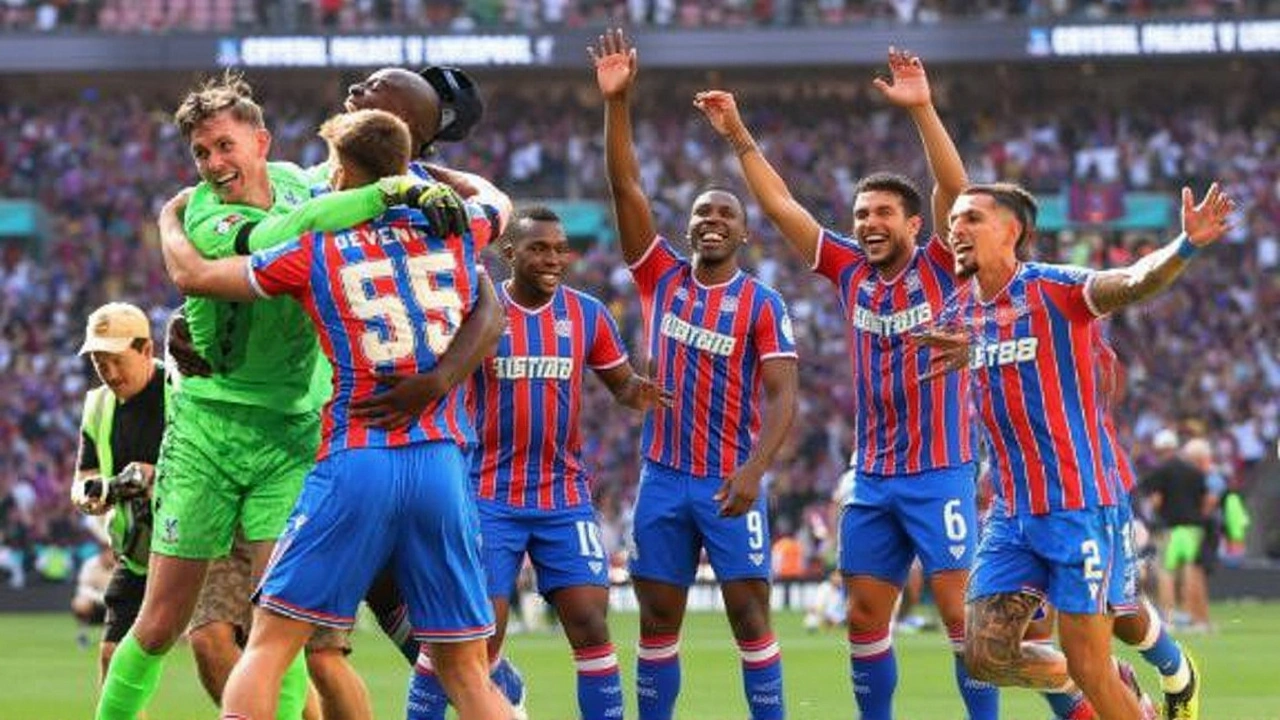Crystal Palace Stun Liverpool with 97th‑Minute Nketiah Heroics to Remain Sole Unbeaten Side

Match Overview
Selhurst Park turned into a theatre of nerves on Saturday as Crystal Palace and Liverpool locked horns in what was billed as the final unbeaten showdown of the early Premier League season. The hosts drew first blood early in the first half when Senegalese winger Ismaila Sarr slipped past the Liverpool defence and placed the ball beyond Alisson Becker. His goal, a low‑driven finish from the edge of the box, set the tone for an intense back‑and‑forth that kept fans on the edge of their seats.
Liverpool replied after a patient build‑up, with Federico Chiesa cutting in on the left and delivering a precise low cross that found the back‑of‑net, leveling the score at 1‑1. The Italian's goal seemed to shift the momentum; Liverpool pressed higher, and Mohamed Salah had several chances, but Dean Henderson in the Palace goal performed a series of crucial saves, denying the Reds a quick restore of their perfect record.
As regulation time wound down, the tempo didn’t ease. Palace’s substitute Eddie Nketiah, brought on in the 75th minute, began testing Liverpool’s back line with quick runs and sharp movements. The breakthrough came in injury time: a lofted pass from Daniel Munoz found Nketiah just inside the penalty area. He clipped a calm, first‑time finish past a diving Alisson, sending Selhurst Park into a frenzy. The goal, coming in the 97th minute, clinched a 2‑1 victory and preserved Palace’s unbeaten status.

Implications for Both Teams
The result does more than add three points to Palace’s tally; it lifts them to the sole unbeaten club in the Premier League, extending their streak to 18 matches across all competitions—a feat last seen under manager Bert Head in 1969. The run reflects a blend of defensive solidity—highlighted by Henderson’s saves—and a knack for striking when chances appear. Young talents like Adam Wharton and Daniel Munoz also earned plaudits, suggesting Palace’s squad depth is deeper than many assumed.
For Liverpool, the loss is a reality check for new manager Arne Slot. After five straight victories, the Dutch tactician will need to reassess his side’s late‑game concentration and defensive organization. While the team showed flashes of brilliance—Salah’s movement and Chiesa’s work rate—Palace’s pressure in the final minutes exposed a vulnerability that could be costly in a long season.
Both managers praised the quality of the encounter. Palace boss highlighted the team’s resilience and the impact of substitutes, while Slot admitted his side was out‑worked in the closing stages and vowed to tighten up. The upcoming fixtures will be critical: Palace aims to maintain momentum and possibly challenge for a European spot, whereas Liverpool must bounce back quickly to keep their title ambitions alive.
Fans left Selhurst Park buzzing, not only for the dramatic finish but also for the narrative it adds to this season’s early storylines. A single goal, crammed into extra minutes, has reshaped the league’s unbeaten landscape and promised even more excitement as the campaign unfolds.
19 Comments
Mohamed Rafi Mohamed Ansari
The tactical shift after the half‑time break, wherein Palace intensified their pressing, undeniably altered the game’s rhythm.
Such an adjustment highlights the importance of adaptive strategies in high‑pressure matches.
For coaches, this serves as a case study in maintaining structural integrity while exploiting transitional moments.
Despite the occasional intresting typo, the overall analysis remains sound.
अभिषेख भदौरिया
Observing the resilience displayed, one discerns a profound testament to collective belief and perseverance.
It is heartening to witness how setbacks can kindle a renewed sense of purpose within a squad.
In the grand tapestry of sport, moments like these underscore the human spirit’s capacity to transcend adversity.
Nathan Ryu
The 97th‑minute resolution serves as a vivid illustration of football’s capacity for dramatic climaxes.
It reinforces the notion that matches are seldom decided before the final whistle, a principle revered by purists.
Nketiah’s composure under immense pressure exemplifies the virtues of mental fortitude that transcends mere physical prowess.
Such instances ought to be celebrated not merely for their entertainment value but for their instructional merit.
Coaches should incorporate these fleeting moments into training modules, emphasizing concentration in the dying minutes.
The defensive lapses exhibited by Liverpool reveal an underlying fragility that opponents can exploit.
Arne Slot’s tactical blueprint, while innovative, appears to lack the requisite focus during extended play.
A systematic review of positional discipline during injury time could mitigate future concessions.
Moreover, the psychological impact on players who concede late goals can erode confidence over a season.
Conversely, the morale boost granted to Palace is likely to resonate through subsequent fixtures.
Historical parallels can be drawn to previous seasons where late‑game heroics catalyzed title challenges.
From a statistical perspective, goals scored after the 90th minute have increased by a modest yet significant margin in recent campaigns.
Analysts must therefore adjust predictive models to account for this evolving trend.
Fans, too, derive a heightened sense of belonging when their team triumphs against the odds in added time.
Ultimately, the match underscores the unpredictable beauty of the sport, reminding all stakeholders of the ever‑present potential for surprise.
In sum, the lesson is clear: never underestimate a side that refuses to capitulate, even in the final seconds.
Atul Zalavadiya
The sheer audacity of the Palace side, flinging Nketiah onto the stage like a maestro, was nothing short of theatrical brilliance.
One could almost hear a symphony of gasps as the ball found the net, a moment that will echo in the annals of Premier League folklore.
It’s as if the gods of football briefly smiled upon Selhurst Park, granting a fleeting glimpse of euphoria.
Such artistry, paired with Henderson’s cat‑like reflexes, paints a portrait of a contest where every brushstroke mattered.
In short, the match was a kaleidoscope of passion, strategy, and raw emotion.
Amol Rane
The performance, while competent, lacked any genuine innovation.
Venkatesh nayak
While Palace’s perseverance is commendable, Liverpool’s structural frailties cannot be ignored – a strategic overhaul is undeniably required. :)
rao saddam
What a roller‑coaster!!! The tension was palpable!!! Every pass felt like a bomb!!! The final strike? Absolutely electrifying!!! This is why we love the game!!!
Prince Fajardo
Oh great, another “late‑goal drama” – just what we needed to remind us that football isn’t actually a sport but a soap opera.
Subhashree Das
The match exposed Liverpool’s systemic vulnerabilities, confirming a pattern of tactical myopia that will likely haunt them throughout the season.
jitendra vishwakarma
Solid win for Palace, really shows they can hold their own.
Ira Indeikina
In the grand scheme, each goal is a ripple in the vast ocean of football destiny, urging us to cherish the fleeting brilliance before it fades.
Shashikiran R
It is evident that teams which ignore the fundamentals of discipline are doomed to repeat their own failures, a lesson Liverpool must internalize.
SURAJ ASHISH
Palace showed grit and earned the win.
PARVINDER DHILLON
What a fantastic display of determination! 🌟 Let’s celebrate this moment and hope for more exciting matches ahead! 😊
Nilanjan Banerjee
Behold the theater of sport, where destiny spins its yarn upon the trembling threads of a single strike, forever altering the narrative of the season.
sri surahno
One must question whether the timing of the decisive goal was merely coincidence or the subtle hand of hidden influences orchestrating the league’s balance.
Varun Kumar
Liverpool’s late lapse proves costly.
Madhu Murthi
Wow, what a surprise that a “small” club could outplay the giants – truly a testament to pure talent! 😂
Amrinder Kahlon
Sure, because nothing says “excitement” like a game decided after the clock hits zero.

Write a comment